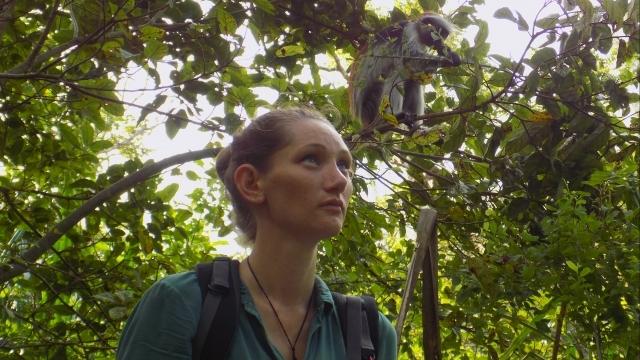
Image: Sofie Semmler
The nutritional ecology of the Zanzibar red colobus (Piliocolobus kirkii) within modified habitats
Colobines are a folivorous primate with unique specialized anatomical and physiological adaptations that have evolved to facilitate the challenges which come with a heavily plant-based diet. Having such specialized dietary requirements make folivorous primates particularly vulnerable when living in disturbed habitats or captive settings. This study focuses on the endangered Zanzibar red colobus (ZRC) monkey (Piliocolobus kirkii), living in a variety of anthropogenically modified habitats within the Jozani-Chwaka Bay National Park, Zanzibar. Some groups have adopted the behaviour of consuming charcoal, which serves as a binding agent to adsorb harmful phenolic compounds found in many introduced plant species. By comparing data on different habitats, feeding plant chemical compositions, diets, behaviours and gut microbiome communities of the ZRC groups who consume charcoal, with those who do not, we gain a better understanding of how these folivores have adapted to cope in heavily modified habitats.
Sofie Semmler is a Ph.D. candidate at the ANU School of Archaeology and Anthropology. Her research investigates the anthropogenic changes to habitats and how this affects primate behaviour, diet and gut health. Sofie graduated from a Bachelor of Science at ANU in 2017, then went on to do Honours the following year, where her project took her to Uganda to study the nutritional ecology of black and white colobus monkeys (Colobus guereza). Grants secured to fund previous research have come from The Australian National University Primate Conservation Fund, Australian National University Research Funding, The Australian Society for Human Biology, Primate Action Fund and Re:wild. Once Sofie has completed her Ph.D., she would like to continue in the area of primate nutritional ecology as it is a vital area of conservation for so many different species.
Location
Speakers
- Sofie Semmler (Ph.D. candidate at ANU)
Contact
- Stacey Ward
File attachments
| Attachment | Size |
|---|---|
| BIAN_seminar_poster_21_June_Semmler.pdf(737.08 KB) | 737.08 KB |